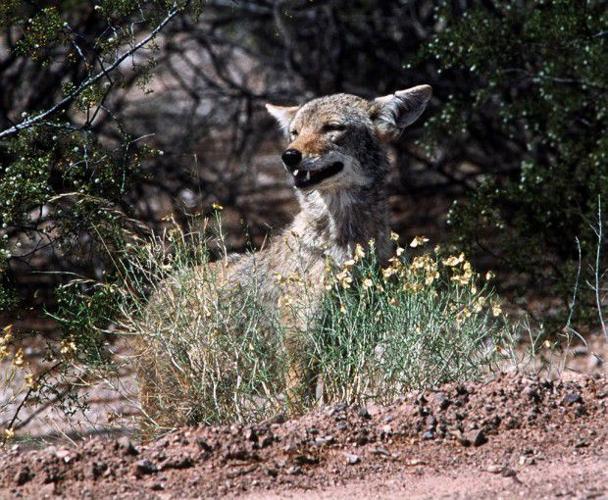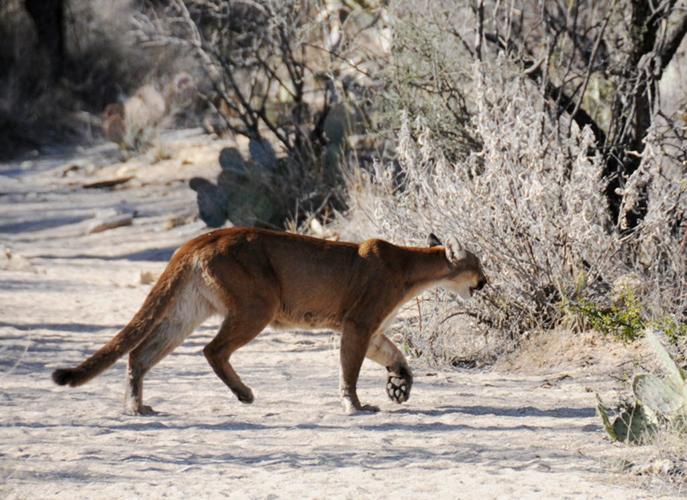A “Varmint Roundup” — in which hunters were to compete for a $1,000 purse for killing the most coyotes, bobcats, foxes and mountain lions northwest of Tucson on Jan. 23 — has been abruptly postponed.
The Tucson Chapter of the Mule Deer Foundation organized the event, in which hunters would have used animal calls to lure their prey into shooting range. A notice appeared Friday, Jan. 15, on its website that read: “Varmint Roundup has been postponed. Keep watching for updates.”
The postponement came a day after the Arizona Daily Star interviewed the foundation’s Tucson chapter chairman, Duane Burmeister, for a story about the roundup.
Efforts to reach Burmeister and Terry Herndon, regional director of the foundation, by phone and email for an explanation of the postponement were unsuccessful.
Opponents of the event had decried it as a “bonafide killing contest” in which participants engage in “thrill killing” and “blood sport.”
Burmeister said in an interview before the postponement that “removing a certain percentage of varmints is a good thing” because it helps deer and other game species to thrive.
State wildlife officials say killing coyotes, bobcats and foxes in unlimited numbers is legal as long as shooters have a valid hunting license. Hunters must obtain a big game tag before killing a mountain lion.
ORGANIZERS’ VIEW
Burmeister said, in the earlier interview, that the contest would benefit other wildlife, but he acknowledged that such contests draw strong opposition. “People think we are going out and killing hundreds and hundreds of animals,” Burmeister said. “That’s not going to happen.
“Removing a certain percentage of varmints is a good thing,” he said without offering an estimate of how many animals might be killed in the roundup. “We know it’s a fragile system, but we’re not out to do harm to it. We’re helping the wildlife (other than the target animals) to survive and prosper.”
He maintained that wildlife species such as deer, elk and antelope benefit when “varmints are removed or thinned out.”
CONTEST DETAILS
The Mule Deer Foundation’s website — www.tucsonmdf.org — noted that roundup participants were to pay a $25 per person entry fee and compete in two-person teams.
Hand calls, open reed calls and electronic calls could be used to draw animals into shooting range.
The foundation said scores would be calculated from a point system for four species included in the contest:
- Coyotes: 5 points; foxes: 7 points; bobcats: 10 points; mountain lions: 35 points.
The foundation website described rewards for winners: “It will be a jackpot payout of $1,000 based upon 100 participants at $25 a head. All proceeds will go to benefit Tucson Mule Deer Foundation projects.”
OPPONENTS’ VIEWS
“Yet another wildlife blood sport has been announced, and this one is a bonafide killing contest,” Greg Hale, a Tucson animal protection advocate, said before the postponement.
“It’s overtly wrong to go out and shoot these animals for a thrill kill,” Hale said. “They call them in with (animal) calls. When they get into range, then they shoot them. They sit there on their folding chairs and shoot them.”
“This is not a hunt. It’s a slaughter,” he said.
He said such contests are “ecologically unsound” because they remove animals that play an important role in the ecosystem.
“We are not opposed to hunting,” Hale said. “We are opposed to contests that treat animals as having no value. We don’t want Tucson to become a mecca for wildlife killing contests.”
Ricardo Small, who holds degrees in wildlife biology and is a member of a group called the Friends of Wild Animals, said he found the planned contest revolting.
“The idea of a group of people gathering to see who can shoot the most animals with guns to win prizes makes me vomit,” Small said. “From a wildlife biologist’s viewpoint, slaughtering predators — they are not varmints — for fun is an activity that should be outlawed by the Arizona Game and Fish Department.”
GAME AND FISH VIEW
“The Arizona Game and Fish Commission has no official position on predator hunting contests,” said Mark Hart, spokesman for the Arizona Game and Fish Department. “It’s a lawful pastime.
“In the 1990s, the commission considered a rule change that would prohibit hunting contests,” Hart said. “It went to the governor’s regulatory review council. At that time, they ruled that we had exceeded our statutory authority and that they were concerned that there might be constitutional issues involved.”





